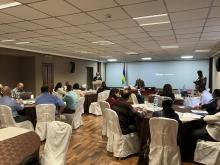Stronger Health Through Smarter Taxes in Mauritius
WHO has joined forces with VISA NGO and the University of Cape Town to assess the impact of increasing health taxes in Mauritius. Using a simulation tool, the study examined how tax hikes affect tobacco use, government revenues, and premature deaths.
📊 A 15% annual cigarette tax increase could:
Boost excise revenue by 55%
Reduce smoking prevalence from 18.1% to 17.4%
Prevent 11,600 premature deaths by 2029
Even more ambitious action—a 25% annual increase—could:
Double excise revenues
Lower smoking prevalence to 16.3%
Save 19,300 lives by 2029
On 20 June 2025, WHO convened high-level officials from the Ministries of Health and Finance to discuss the findings, presented by the University of Cape Town’s Research Unit on the Economics of Excisable Products and a WHO taxation expert.
WHO and VISA echoed the study’s call for regular, significant tax increases—one of the most effective ways to curb noncommunicable diseases (NCDs)
Earlier, on 26 May, VISA and WHO presented the findings to key stakeholders including the Mauritius Revenue Authority, Ministries of Education and Youth, the University of Mauritius, NGOs, and consumer groups.
WHO also applauded the Government’s recent decision to raise taxes by 10% on tobacco and alcohol, and 100% on sugary drinks, extending it to products like chocolate and ice cream.
“This is a gift to public health,” said Dr. Anne Ancia, WHO Representative. “Higher prices on unhealthy products help reduce consumption—especially in a country where obesity, diabetes and cardio-vascular diseases are leading causes of death and disability.”
Dr. Ancia also stressed the urgent need to enforce the Tobacco Law 2022, particularly the ban on single-stick sales, which undermines progress in reducing tobacco use through higher prices.






